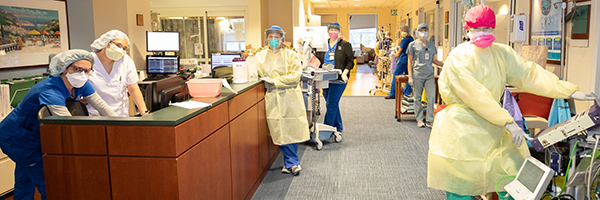EP5
Interprofessional Care EP5
- Provide one example with supporting evidence, of nurses’ participation in interprofessional collaborative practice to ensure coordination of care across the spectrum of healthcare services.
Nurse Navigators Participate in Interprofessional Collaborative Practice by Providing Survivorship Care Plans, Coordinating Post-treatment Care and Providing Resources Based on Assessed Needs
The Oncology Nurse Navigator is described by the Oncology Nursing Society as a professional registered nurse with oncology-specific clinical knowledge who provides individualized assistance to patients, families and caregivers to help overcome healthcare system barriers. (Evidence EP5-1, Nurse Navigator Job Description)
Background
Patient A.B. was diagnosed with a stage IIIa lobular left breast cancer in spring 2018. She was clinically obese at the start of her treatments, which put her at high risk for complications and for the development of other cancers. A.B. met with Oncology Nurse Navigator Lynn Carbino, BSN, RN, OCN in spring 2018 and developed a close relationship. A.B went through surgery and four cycles of chemotherapy, followed by five weeks of radiation therapy with concurrent anti-estrogen medication. Carbino met with A.B. frequently over the course of her illness, providing her with resources, listening to her thoughts and fears and supporting her during her treatments. Carbino discovered that A.B. worked locally, and they shared multiple stories about their lives and experiences at every visit. Carbino screened A.B. for distress using the NCCN Distress Thermometer and referred her to local support groups, a dietitian and the oncology social worker. (Evidence EP5-2, Distress Thermometer and Note)
Carbino provided support and education regarding A.B.’s treatment and coordinated appointments for her, serving as a liaison with her care team. Following treatment, A.B. was enrolled in the Be-Well Study, a clinical trial focusing on post-treatment weight loss and health, and she was referred to participate in the NEXT Step program, an exercise-based post-treatment program through the Physical Medicine department. (Evidence EP5-3, NEXT Step Program Brochure)
Interprofessional Collaborative Practice
A.B. completed her treatments in fall 2018 and met with Nurse Navigator Carbino to receive her treatment summary and interprofessional survivorship care plan. (Evidence EP5-4, Survivorship Care Plan and Treatment Summary) At this meeting, Carbino gave her a summary of the treatments administered and resources to help A.B. going into her follow-up care, including referrals to the dietitian, counseling services and the cancer rehabilitation department. A.B. was eligible to take part in the NEXT Step program and was determined to be eligible for the Be-Well Study clinical trial.
In September 2019, A.B. developed hand swelling on the same side of her breast surgery and was concerned about lymphedema. She therefore contacted Carbino, who referred her to the Physical Medicine department for assessment and possible treatment of early lymphedema. (Evidence EP5-5, Telephone Note)
Nurse Participation
A.B. has currently lost approximately 30 pounds from the weight-loss trial and is continuing to progress well. She regularly sees her surgeon, medical and radiation oncologists, and primary care physician. She stays in communication with her nurse navigator and uses the resources provided to her. A.B. sometimes contacts Carbino to ask which physician she should see regarding a certain concern.
In summer 2019, A.B. attended Swing into Survivorship, Greenwich Hospital’s annual cancer survivorship event, where she reconnected with her physicians, nurses and care team to celebrate her completion of treatment. At this event, she learned about more community resources available to patients from diagnosis through survivorship and shared her experiences with other cancer survivors.
A.B. continues to benefit from her relationship with her care team and the many healthcare services offered.

